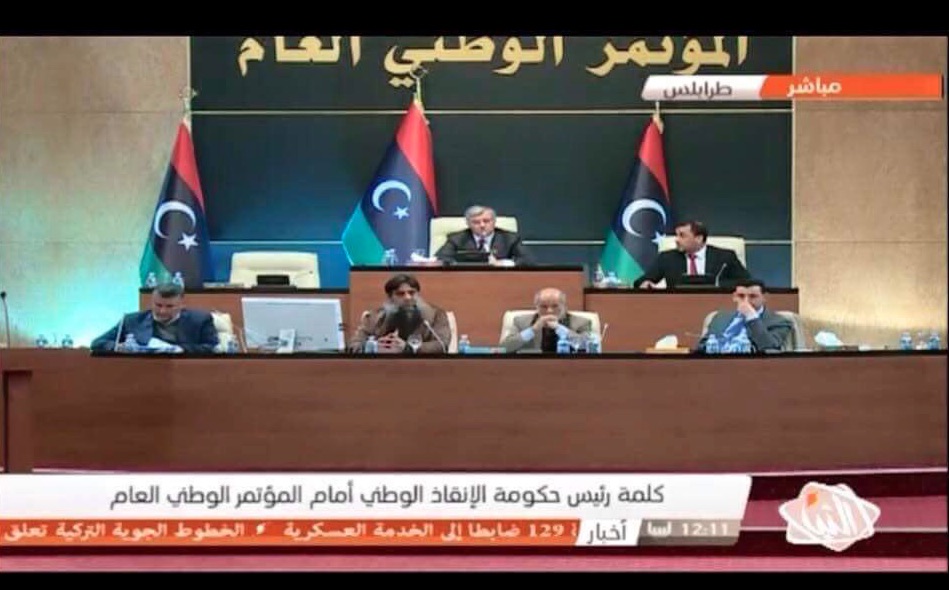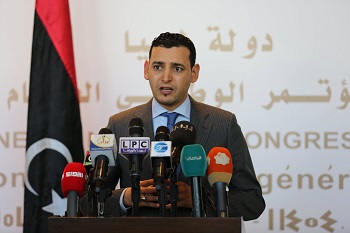By Farah Waleed.

Tripoli, 7 January 2015:
In a bid to slash spending in the face of plummeting income, the Tripoli “government” of . . .[restrict]Omar Al-Hassi plans to remove subsidies on fuel and electricity. It has also told the continuing General National Congress that it wants to stop the payment of the family bonus, suspend planned salary increases and the payment of any benefits to government officials, and enforce the use of national IDs in paying government salaries.
It is hoped the latter move will end the payment of more than one salary to the same person and of salaries to phantom employees.
The recommendations were made at a rare meeting yesterday of nearly all the key officials in the Libya Dawn-supported regime in the capital.
Tripoli prime minister Omar Al-Hassi along with Saddek Elkaber, head of the Central Bank of Libya in the capital, Hassi’s Chief of Staff Major-General Abdulssalam Jadallah Obeidi, and his head of intelligence attended a special consultative meeting with members of the continuing General National Congress headed by Nuri Abu Sahmain yesterday to discuss dwindling income as well as other issues relating to the current political crisis.
“The decline in oil production to around 240,000 b/d, a fall of oil prices and increased spending have caused a massive budget deficit,” Congress spokesman Omar Hemidan said at a press conference afterwards. Asking Libyans to be patient, he said there could be no more money spent on salaries. “We are at war” he said, and money had to be spent on munitions.
The move mirrors that of the government in Beida, faced with the same spending headaches. At its first meeting of the new year in Beida six days ago, it agreed as part of its austerity efforts to cut spending on the needs of displaced Libyans and reduce the number of attachés at Libya embassies around the world.
By coincidence (or possibly not), Sheikh Sadik Al-Ghariani, who is recognised as Grant Mufti by those in power in Tripoli but no longer by the House of Representatives in Tobruk and the government in Beida, called on Hassi to stop paying salaries to anyone not turning up to work, cut the salaries of higher paid officials and end the system whereby some government employees were drawing more than one salary. He also demanded an end to bonuses for government employees.
It is not clear how the deliberations of the continuing Congress will in fact help the Hassi administration’s financial problems. The presence of Elkaber at the meeting was the clearest sign yet of his ties to Hassi and Congress, but the Central Bank has been trying to take a neutral position, paying out only state-sector salaries and costs and for subsidises. It has not, supposedly, being paying for any projects or any military costs other than wages.
In addition to the austerity plans, yesterday’s consultations at Congress included briefings by the Chief of Staff and the head of Intelligence on the recent airstrikes and the military situation in which, they claimed, foreign countries and foreign intelligence were playing a part.
Moreover, according to Hemidan, it was agreed that the Hassi administration and Congress had to reach out and convince the international community that they were the only legitimate authorities in the country. They also had a duty to ensure that the media was informed about the “just cause” of the revolution and did not disseminate “falsehoods and lies” about the actions of the revolutionaries.
The meeting also included a discussion on local needs, including those of internally displaced people, the needs of those who had been wounded and the crisis in the hospitals.
It was impossible to tell how many members of Congress attended the session. TV coverage of the proceedings showed only those on the podium. For his part, Hemidan no longer gives such figures.
For what is thought to be security reasons, the area near the Rixos conference hall where the Congress meets was cleared and shops told to close while the meeting took place. [/restrict]







